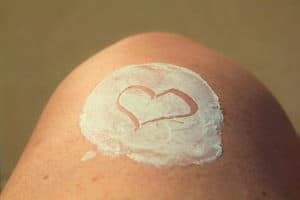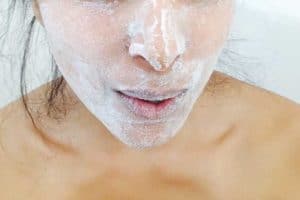Dry, cracked hands are quite common. They’re not the most serious skin issue, but they can be painful, unsightly, and susceptible to infection. What home remedies can you use to keep your hands soft, smooth, and healthy all the time?
7 of my favorite home remedies for dry, cracked hands are as follows:
- Use Gentle and Natural Moisturizers
- Soften Hard Water
- Use a Humidifier
- Exfoliate Your Hands
- Use Mild Laundry Detergents
- Manage Stress and Anxiety
- Follow a Balanced Diet
I’m a big fan of applying aloe vera, moisturizers, using overnight treatments, avoiding harsh soaps, using a humidifier to combat dry air, managing stress, and wearing gloves.
Read on to learn more about my favorite home remedies for dry, cracked hands, as well as the causes for dry and cracked hands.
Also, for an excellent product to heal your dry and cracked hands, take a look at our top pick, the ELEMIS Skin Nourishing Milk Bath:
Click here to see it on Amazon.
7 Home Remedies for Dry Cracked Hands

1. Use Gentle and Natural Moisturizers
Going for natural moisturizers, such as pure vegetable oils, could be worth trying. Many commercial moisturizers can have a ton of irritating, drying, and harmful ingredients, such as alcohol, fragrances, mineral oil, preservatives, and propylene glycol.
Below I list some of my favorite dry hand oils that will protect and nourish your skin:
Virgin Coconut Oil (VCO)
Pure coconut oil has many beneficial properties for the skin. It’s rich in lauric acid, which has antibacterial properties. It’s also great for dry, cracked hands because it’s incredibly hydrating.
Plus, a study shows that it’s a weak type of sunscreen, which blocks around 20 percent of the sun’s UV rays. [1] There are many known damaging effects of ultraviolet radiation, including side effects like dry skin and hyperpigmentation.
Sweet Almond Oil
Sweet almond oil is perfect for people with dry and sensitive skin. It has been extensively used for making cosmetic products because of its moisturizing and soothing properties.
It contains minerals and vitamins, such as vitamin D and vitamin E (tocopherol), which can protect the skin from UV radiation damage and rebuild your skin’s moisture barrier.
Important Note: Avoid using almond oil if you’re allergic to nuts.
Sunflower Oil
Sunflower oil is cold-pressed from the seeds of the sunflower plant. Like the other two oils, it’s also rich in vitamin E, a moisturizing and anti-aging vitamin. The skin can easily absorb it, so you get results immediately and don’t have to deal with the sticky feeling.
2. Soften Hard Water
If you want a free and simple way of softening hard water, boiling is your best option. Heating the water causes certain minerals, such as calcium carbonate, to settle at the bottom of the pot (once the water cools down).
One of the downsides of boiling is that it only works for small quantities of hard water.
A more effective way of dealing with hard water at home is by using a salt-based ion-exchange water filter. Here’s how it works:
- Your tap water moves through the mineral tank.
- There, hard minerals (e.g., calcium and magnesium) come in contact with a bed of salt-covered, plastic resin beads.
- Once that happens, these minerals are exchanged for sodium ions.
3. Use a Humidifier
A favorite tip for how to fix dry cracked hands is to use a humidifier. A humidifier is a great way to add moisture to the air at home. This device is particularly helpful for treating dry skin and decongesting airway passages, as well as easing the symptoms of the common cold and flu.
Below are three tips for choosing and using humidifiers:
1. Cool Mist Humidifier or Warm Mist Humidifier, Which Should You Buy?
Both types can be used to relieve dry skin. If you need a humidifier that operates on less electricity, or if you need one that can cover a larger area, a cool-mist humidifier is a better choice.
If you want a humidifier that has a low risk of bacterial contamination and will make your winters slightly warmer, a warm mist humidifier is an excellent choice.
2. Think of the Ease of Maintenance
Humidifiers only require cleaning once a week. But if you use your humidifier often, you may need to deep clean it three times per week.
Cleaning a humidifier is usually easy. Simply unplug your humidifier and empty the water that’s left inside it before cleaning.
Wash it using regular soap and water (distilled or demineralized water is preferable), and then let it dry fully (about 24 hours) before using it again.
3. Determine the Amount of Space It Needs to Cover
Manufacturers usually specify the coverage area and maximum output of their products.
In general, tabletop humidifiers that can disperse 1.5-4 gallons of mist or moisture are ideal for small rooms, which are less than 400 square feet. Personal or portable humidifiers are appropriate for a space that’s up to 25 square feet.
4. Exfoliate Your Hands
Exfoliation helps you to get rid of old, dry, and rough skin. This process also reveals fresher, softer, and smoother skin if done right. The American Academy of Dermatology states that it can boost the effectiveness of skincare products by enhancing their absorption through the skin. [2]
There are two major types of exfoliation: physical and chemical. Since it can be drying and cause little tears in the skin, physical exfoliation is often not recommended for dry skin.
For dry, cracked hands, chemical exfoliation might be a better choice. This type of exfoliation uses enzymes or acids (alpha hydroxy acid and beta hydroxy acid) to dissolve and loosen dead skin cells.
Compared to physical exfoliation, it produces uniform results and is usually safer since it doesn’t involve scrubbing the skin.
How often should you exfoliate your hands? You only need to exfoliate hands or anywhere else on your body about twice a week. The length of time a chemical exfoliant stays on your skin will depend on its strength and type.
If you’re going to exfoliate mechanically, aim for 30 seconds. Be sure to use gentle, circular movements to avoid tearing your skin.
5. Use Mild Laundry Detergents
Commercial laundry detergents contain many ingredients that aren’t only drying but can also be harmful to your health. Some of these harmful ingredients include:
- Phosphates
- Formaldehyde (also known as formalin)
- Sodium laureth sulfate
- Sodium lauryl sulfate
- Chlorine bleach
- Dioxane
- Ammonium sulfate
- Quaternary ammonium compounds
- Fragrances
- Optical brighteners
- Nonylphenol ethoxylates
- Dichlorobenzene
- Benzyl acetate
- Dyes
It’s almost next to impossible to keep track of these harmful ingredients. If you’re open to the idea, you might want to consider going all-natural. You can try the following natural cleaning agents instead:
Baking Soda (Sodium Bicarbonate)
This chemical compound is often used as a bleaching agent. You can use baking soda to brighten your white or colored clothes, including bathing suits. What’s great about it is that it won’t damage your washing machine.
Borax (Sodium Borate)
Borax is an effective stain and odor remover. It’s particularly useful in removing urine stains and odor, which is why some mothers use it to soak cloth diapers.
Since it doesn’t get absorbed by the skin, it’s often considered nontoxic if used in limited quantities. It can also help treat certain skin problems.
White Vinegar
Like baking soda, you can also use white vinegar to brighten and whiten clothes. It’s gentle and calming on the skin but powerful enough to get rid of residues left by laundry detergents and bath soaps.
To use white vinegar, pour at least 4 ounces (1/2 cup) of white vinegar into your washing machine detergent compartment. Never mix your laundry and vinegar in the same load.
6. Manage Stress and Anxiety
My last tip for how to fix dry cracked hands is to manage stress. Stress and anxiety can affect your skin’s health and appearance in a lot of ways. Both can cause your skin to become extremely dry and irritated.
These conditions can also worsen inflammatory skin diseases, such as eczema and psoriasis, including allergic reactions (by increasing histamine in your bloodstream).
Here are a few ways to combat stress and anxiety:
- Breathe deeply! Doing daily, deep breathing exercises for at least 20-30 minutes can help keep you calm and relaxed.
- Get enough shut-eye. Every night, you should strive to get 8 to 9 hours of sleep. If you’re sleep-deprived, your body will keep producing stress hormones, such as adrenaline, cortisol, and norepinephrine. High levels of these stress hormones make it harder for you to sleep and put your health at risk.
- Learn effective time management strategies. These strategies include making a to-do list, establishing a time limit for each task, and delegating non-critical activities or tasks.
- Exercise or do sports. Exercising increases your endorphins, which will help you feel less pain and combat other adverse effects of stress or anxiety.
- Start a “stress journal.” Reduce stress and anxiety by journaling. Expressive writing can help you improve the emotional, mental, and physical challenges of daily life.
7. Follow a Balanced Diet
A poor diet deprives your skin of vital nutrients, leading to the development of wrinkles, dry skin, and other skin issues. Include the following foods to keep your skin hydrated, smooth, and healthy:
- Omega-3 fatty acids: fatty fishes (salmon, trout, and mackerel), shrimp, spinach, clams, walnut, and flaxseed oil
- Nuts and seeds: almonds, walnuts, and sunflower seeds
- Dark, leafy vegetables
- Citrus fruits: tangerines, pomelo, and lemons
- Avocados
- Broccoli
- Tomatoes
- Sweet potatoes
- Soy
- Red or yellow bell peppers
6 Common Causes of Dry and Cracked Hands

1. Dry and Cold Air
If there’s a lack of moisture in the air, your hands and entire body start to become dry. Skin dryness becomes more common in the winter months when cold air is unable to hold onto water efficiently.
In fact, your skin may lose over 25 percent of its capability to retain moisture during this season. [3]
30 and 50 percent is an ideal humidity range. By staying within this range, you can minimize the risk of developing symptoms of allergy, upper airway illnesses, and dry skin.
2. Harsh Detergents, Shampoos, and Soaps
Most shampoos and soaps on the market remove the natural, protective oils in your skin, causing it to become dry, flaky, and cracked.
They also contain irritating and drying ingredients, such as sodium lauryl sulfate (SLS) and ammonium lauryl sulfate (ALS), which are also widely used in making cleansers, detergents, and personal hygiene washes.
Commercial laundry detergents contain bleach, synthetic fragrances, and dyes. These ingredients are often associated with allergic contact dermatitis, which causes extremely dry, cracked, itchy, and scaly skin.
3. Washing Your Hands Too Much
Washing your hands is good. Scrubbing them vigorously or frequently is bad. It can strip natural oils in your skin, leaving it dry and irritated.
The Centers for Disease Control and Prevention recommends washing your hands for a full 20 seconds to remove germs and dirt effectively.
Humming the ‘Happy Birthday’ song from start to end two times will also make sure you’re washing for 20 seconds. [4] It doesn’t matter if you use cold, lukewarm, or warm (not hot) water for this purpose.
4. Hard Water
The United States Geological Survey defines hard water as water that has a high concentration of added minerals, such as calcium, potassium, and magnesium.
Washing your hands with hard water can potentially cause redness and dryness of the skin. If you have an existing inflammatory skin condition, such as eczema, hard water could make it worse.
5. Your Genes
If you can’t get rid of severely dry, cracked hands, no matter what you do, there’s a good chance you inherited the condition. According to the researchers at the University of Dundee (Scotland), dry skin can be passed down from parent to child. [5]
The researchers discovered that changes to the genes responsible for managing the production of filaggrin, a protein that aids in the formation and hydration of the skin’s barrier, could lead to several skin conditions. People with this gene mutation, which affects around 10 percent of the population, are also more likely to develop eczema.
6. Certain Medications
Diuretics or medications that remove excess fluid or salt from the body are common offenders. Examples of diuretics are hydrochlorothiazide and furosemide. Other medications that can severely dry out your skin include:
- Cholesterol medications (e.g., pravastatin, simvastatin, and lovastatin)
- Antihistamines (if you take them for too long)
- Acne medications
Conclusion – Home Remedies for Dry Cracked Hands
You could use humidifiers, moisturizers, stress management techniques, demineralized water, the aloe vera plant, overnight skin treatments, and chemical exfoliants to treat extremely dry cracked hands at home.
As much as possible, try wearing gloves and avoid irritants from detergents and soaps to protect your hands. Lastly, keep a balanced, healthy diet to combat dry skin.
My top 7 favorite home remedies for severely dry cracked hands are as follows:
- Use Gentle and Natural Moisturizers
- Soften Hard Water
- Use a Humidifier
- Exfoliate Your Hands
- Use Mild Laundry Detergents
- Manage Stress and Anxiety
- Follow a Balanced Diet
This list of home remedies is by no means an exhaustive list. Feel free to do more research and ask your dermatologist for expert advice.



![How to Get Dead Skin Off Lips [6 Natural Remedies] how to get dead skin off lips](https://skincaregeeks.com/wp-content/uploads/2021/04/how-to-get-dead-skin-off-lips-150x150.jpg)


